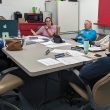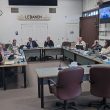By Sarah Brown
Lebanon Local
Some years ago, Roseanne Hartness, a staffer at the Lebanon school district, began coordinating clothing and food supply provisions for students who were found to be in need.
Her work grew and became known as the backpack program that supplied weekend food for kids. The program has recently been halted in exchange for providing meals to families through the food services department at the district.
The clothing supplies have also been halted because there is no longer any room to store the clothes, said Julie Miller, community liaison at the Welcome Center.
But five ladies at the Welcome Center are continuing Hartness’ legacy by pooling together available resources and working as a team to undergird the students’ growth.
Before the Welcome Center got its “makeover” and expanded services in 2018, Hartness was the lone operator providing services for students facing homelessness and food insecurity.
Today it’s expanded and run by Miller, Yesenia Rodriguez, Mindy Hoeckle, Stephanie Herb and Julie Campbell, who act as liaisons to connect families to the resources they may need to help support their child’s learning.
Most of the women sort of worked for the district on their own, serving functions for family, homeless, Latino, and general community support, Hoeckle said.
“What we talked about was kind of wanting to eventually have something that was more like wraparound services, more inclusive, and more dynamic than what it was,” she said. “The cool thing about what we have right now is we have a whole bunch of different people with all kinds of different strengths, making it strengths-based.”
Working together in the Welcome Center, they became a team, being able to meet the different needs using different branches.
“I don’t think we would even be able to reach a fraction of the people that we would if we didn’t have this team coming together,” Hoeckle said.
Campbell and Herb serve the homeless population under the McKinney-Vento Act. Miller and Rodriguez are community liaisons, and Hoeckle provides family support.
As “community liaisons,” Miller and Rodriguez provide general support services for students and families.
“My favorite role is the community piece,” Miller said.
She networks with several civic organizations to help connect all the resources, she said. The other part of her role involves helping kids in need of school supplies, clothes and hygiene.
On her own time, Miller works with community services that provide those supplies, and she helps organize giving trees for Christmas.
Rodriguez is the community liaison for Latino families in the Lebanon school district. She serves approximately 250 students in 40 or so families, many of which don’t speak English well enough to function without her help.
“Most of the resources around here don’t have a translator, so that makes it harder for a person that has that language barrier,” Rodriguez said.
The school district has four instructional assistants between Seven Oak, Green Acres and the high school, as well as an English Learners coordinator, all who assist the students in class. Rodiguez has become more of the point person for working with the parents.
“With Latino families, we need to get their trust first for them to open up, and so I think God has given me the grace to get their trust,” she said.
She reaches out to the families to make sure they are getting all the services they need, and sometimes they’ll call her for help.
Before COVID, Rodriguez and her bilingual cohorts held monthly “Latino forums,” a time for the families to stay connected to the services available to them. Guest speakers would be there sometimes to speak on a range of topics, such as insurance, legal or border issues, too.
Meetings are now held via Zoom. Rodriguez checks in with the families and asks if they need anything or have any questions. If she doesn’t have an answer, she goes to her Welcome Center team and gets one.
Rodriguez also helps supply the families with Thanksgiving and Christmas boxes, and any needed school or hygiene supplies. More recently, she has begun supplying transportation for the families to access the location where the hygiene supplies are distributed through BeUndivided.
Lately, Rodriguez has perhaps realized just how well she takes care of Lebanon’s Latino community. Some of “her” families had to move to different school districts, and they still call her for help because their new school district doesn’t supply the assistance she has provided them.
“I was pretty surprised that the families don’t feel supported and don’t feel that they have the same support that they have here,” she said.
For such a relatively small school district, Lebanon goes above and beyond to help all families that experience barriers, Hoeckle noted.
Besides language, some other barriers that can hinder a child’s learning are homelessness and legal issues.
Hoeckle works on the comprehensive “intense” family cases. She helps families who are dealing with domestic violence, trauma, child abuse, mental health, and the like.
“I think the barrier sometimes is that a system is so big and impersonal that people just don’t know how to (work with it),” she said. “People are coming to us extremely overwhelmed, and they’ve already had trauma before, and they may have given up. We’re trying to humanize it for them because they deserve that. They deserve our love and respect, and our honor and commitment to make sure that they can get those needs for them and their children.”
To help, Hoeckle walks them through those systems and sort of holds their hands.
“We all know that if you don’t support the family unit – that’s your foundation – kids can falter with that inconsistency,” she said “You have to come around and support that firm foundation, and that way they can branch out and get the different supports that they need to hopefully become self sufficient and empowered.”
Herb and Campbell work with the homeless students who live in tents and trailers, or stay temporarily with friends and extended family.
“A lot of families are unfortunately staying in camp trailers right now,” Herb said. “I have so many on my case load.”
Heat, refrigeration and transportation become issues that Herb and Campbell come across.
“I just am trying to make sure that wherever they go, we’re able to get transportation from the school district – even if it’s all the way in Sweet Home – and get them back to their home school, if that’s what best serves their needs,” Herb said.
Last year the school district had about 300 kids who were classified as homeless, but this year the list only runs to 170, she said.
“It’s not because there’s fewer homeless kids at all. In fact, I would definitely say that there’s quite a few more.”
That’s because the kids have gone to virtual learning and/or just “off radar,” she said.
But together, as a team, Herb and the other four women work together like gears to find those students who need help, and provide as much support as they can.
“You have some very passionate women and men who want to be out there and figure out how we can best support these families. And that’s the difference in this small community,” Hoeckle said.




